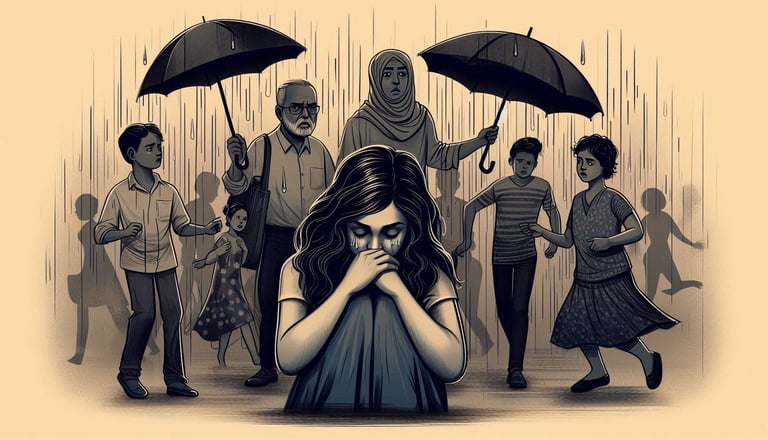Aparajita Bill- Reformative or Politics?
Vandna Singh
Kazi Nazrul University
This Blog is written by Vandna Singh, a Second Year Law Student of Kazi Nazrul University


Introduction
The recent RG Kar Medical College Hospital incident has deeply unsettled the nation, leading to ongoing protests across India since August 9th. The West Bengal government has come under intense scrutiny, with both the media and the public expressing outrage, while political parties engage in blame-shifting. Amid this charged atmosphere, on September 3rd, the West Bengal Assembly unanimously passed the Aparajita Women and Child (West Bengal Criminal Laws Amendment) Bill, widely referred to as the anti-rape bill. The Aparajita Bill is being promoted as a reformative step toward amending existing criminal laws concerning rape. It has sparked mixed reactions across India—some hail it as a “pathway to a secure nation,” while others criticize it as a political maneuver. Amid this debate, concerns over women’s safety continue to rise, reflecting the growing anxiety among Indian citizens.
Sections of BNS, BNSS, and Aparajita Bill
The Bharatiya Nyaya Sanhita (BNS) and the Bharatiya Nagarika Suraksha Sanhita were introduced in India on July 1st, 2024, replacing the long-standing Indian Penal Code (IPC) and Code of Criminal Procedure (CrPC). These new criminal laws were hailed as reformative, incorporating several new provisions and introducing various modern legal concepts. However, despite these changes, provisions related to rape largely remained unchanged. Rape, a grave and heinous crime involves unlawful sexual intercourse without a person's consent. Following are a few significant sections Aparajita Bill aims to reform:
· Section 64 of the BNS mandates a minimum of 10 years of rigorous imprisonment, extendable to life, plus a fine for rape. The Aparajita Bill intensifies this, revising the punishment to either life imprisonment or the death penalty for the offender.
· Section 70(1)(a) of the BNS prescribes a minimum of 20 years of rigorous imprisonment, extendable to life, along with a fine for gang rape. The Aparajita Bill replaces this with either rigorous life imprisonment or the death penalty for those convicted of gang rape.
· Section 124(a) of the BNS mandates at least 10 years' imprisonment, extendable to life, and a fine for causing grievous hurt, including with acid. The Aparajita Bill increases this to life imprisonment.
· Section 193 of the BNSS stipulates that an investigation must be completed within 2 months of filing the FIR. In contrast, the Aparajita Bill shortens this period to 21 days, allowing a possible extension of up to 15 days, which must be approved by an officer no lower than the rank of Superintendent of Police.
· Section 346(1) of the BNSS outlines a trial duration of two months for offenses under Sections 64, 65, 66, 67, 68, 70, or 71 from the date of filing the chargesheet. In contrast, the Aparajita Bill shortens this timeframe to 30 days for trial completion from the date the chargesheet is filed.
Towards Change or Mere Politics?
Although the Aparajita Bill holds significant promise, the introduction of new laws has little value if the legal system does not effectively address their enforcement. In a recent assembly session, West Bengal Chief Minister Mamata Banerjee ironically stated, "Rape is a curse against humanity, and social reforms are required to prevent such crimes."
The 2012 Delhi gang rape and murder, known as the Nirbhaya Case, sparked widespread public outrage and led to the enactment of tougher laws and the expansion of existing ones. However, the data followed raises concerns. Data from the National Crime Records Bureau (NCRB) reveals that around 25,000 rape cases were reported in India in 2012, while this figure increased to 31,000 in 2022. A 2018 government report indicates that, on average, one woman is raped every 15 minutes in the country.
Amid the protests surrounding the RG Kar Medical College case, rape convict and self-proclaimed godman Asaram Bapu was granted parole for 7 days. In 2024, reports highlighted how Ram Rahim, another rape convict, was granted parole 7 times within 2 years. In 2024, the Gujarat High Court granted parole to one of the rape convicts involved in the Bilkis Yakub Rasool vs. Union of India case. It appears that rape convicts spend more time on parole than serving "rigorous punishment" in jail. This highlights that, while laws have been enacted, the broader issue of women's safety remains unaddressed.
Conclusion
In 2017, former Justice Hon'ble J. Chelameshwar emphasized that well-crafted laws, while important, only achieve their purpose when properly implemented. He pointed out that the real challenge lies not in the creation of new legal frameworks but in their effective enforcement. Although the Aparajita Bill carries strong potential for change, the introduction of new laws alone holds little significance if the legal system fails to ensure their thorough application. Without robust implementation, even the most promising legislation risks becoming ineffective, leaving the core issues of justice and accountability unaddressed.
While stricter laws are undoubtedly necessary, the primary focus should be on reform and proper implementation. Existing laws could be effective if enforced correctly. We have become desensitized to these horrifying offenses, treating each new crime as just another day in India. Since the RG Kar Medical College case, numerous shocking rape incidents have been reported. Despite ongoing protests, these crimes persist because we avoid addressing the core issue: effective action. There is an urgent need for proper implementation within the legal system, ensuring that convicts of such heinous crimes are held accountable. As Mamata Banerjee noted, only social reforms can bring about meaningful change.
References
· Bharatiya Nyaya Sanhita, 2023
· Bharatiya Nagarika Suraksha Sanhita, 2023
· https://www.aljazeera.com/news/2020/1/10/one-woman-reports-a-rape-every-15-minutes-in-india
